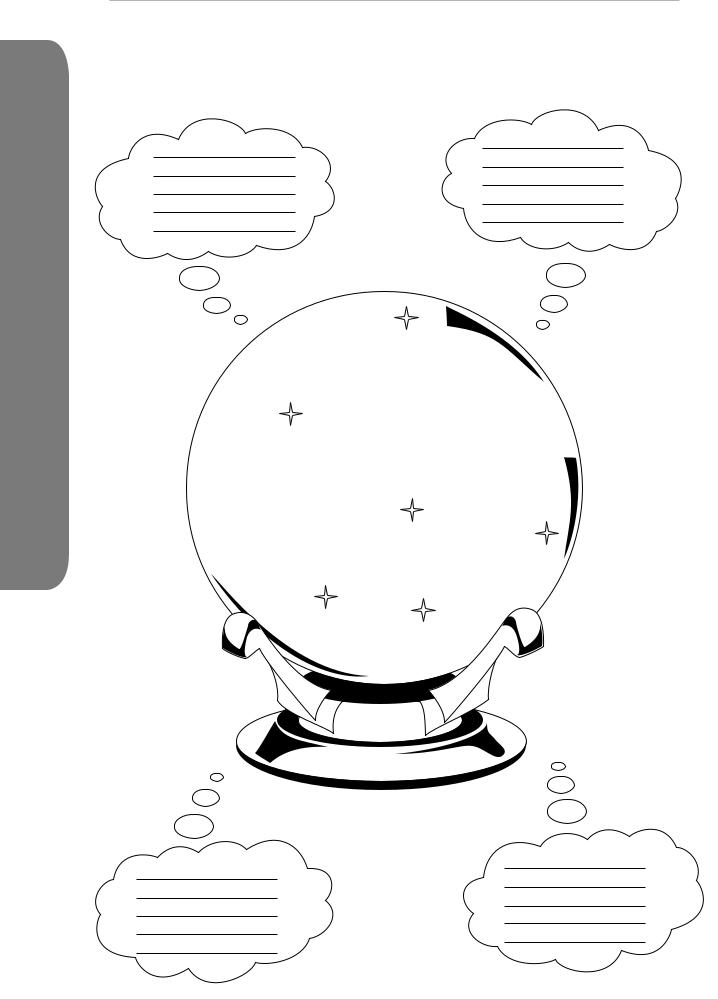
yastrebova_Part_1
.pdf
Chapter 3. Unit 5. Predictions and Expectations
 Английский язык для международников и регионоведов. Часть I
Английский язык для международников и регионоведов. Часть I
THE RIGHT WORD IN THE RIGHT PLACE
ANOTHER, the OTHER, (the) OTHERS
Number |
Indefinite |
Russian |
Examples |
|
Pronouns |
|
|
|
|
|
|
Singular |
another* |
1. еще один |
1. Could I have another look at the map? |
|
|
2. какой-нибудь, |
2. Could I have another test instead of an |
|
|
другой |
x-ray? |
|
the other |
другой (из двух) |
When Eric heard Sam on the other end of the |
|
|
|
line, he hung up. |
|
|
|
|
Plural |
others / other + |
другие |
Some college students prefer to live alone. |
|
pl N |
|
Others / other students prefer to live with |
|
|
|
roommates in a dormitory. |
|
the others / |
остальные |
One of the young men is played by a real |
|
the other + |
|
actor; the others / the other actors are non- |
|
pl N |
|
professionals. |
|
|
|
|
Note:
* Another can be used with plural nouns before few or a number:
NB We hope the weather stays this way for another few days (еще несколько дней). In another fi ve miles we will be at Roan Mountain (еще через пять миль).
Ex. 1. Explain the use of the indefi nite pronouns by giving their Russian equivalents.
1.Gently we tried to persuade him to look at things in another way.
2.Luke found himself in a long room with a low ceiling. At one end he saw a piano; at the other, a kitchen range.
3.Could I have another glass of milk?
4.You can get ideas and tips from other holidaymakers in our Forum.
5.“But you lied to him. He could easily find out that Luke isn’t a diplomat from Paris.”“Then I’ll tell him another story.”
6.Two men were sitting on the couch, drinking coffee and smoking. One was a uniformed patrolman; the other was probably a detective.
7.He saw a group of men talking. One of them said something; the others laughed.
8.Disneyland may be the happiest place on earth for some people, but others hate the idea
of standing in lines in the heat to ride a two-minute roller coaster (аттракцион «американские горки»).
9.Ronald is like all the other children in his class. He studies the same subjects and appears for the same exams with the other children at the end of each term.
10.The United Nations Security Council has decided to maintain its mission in Western Sahara for another month.
Ex. 2. Fill in the gaps with (an) other, (the) other(s).
1.She picked up the bedside phone and dialed Anthony’s office. At __________ end, the phone rang unanswered.
2.Bob suffered _____________ shock when he found out that the cost per month in a nursing home for his mother’s special needs was $18,000.
3.Why do some people head for a neighborhood park every chance they get, while
____________ never go?
204

 Английский язык для международников и регионоведов. Часть I
Английский язык для международников и регионоведов. Часть I
4.In __________ few years, they’ll have graduated and will be getting first jobs and starting families.
5.Police departments say that, although 90% of the runaway children return home within 60 days of leaving, _____________ never go back.
6.I had waited five minutes already, and then had to spend ____________ ten minutes listening to the manager tell off an employee.
7.The captain told me that I should go out to the ship and help __________ unload the supplies.
8.Getting the best out of your studies at university is forgoing (жертвовать) one thing for ________.
9.Some students have part-time jobs and/or families to think about, ____________ students who have neither of these factors, may instead enjoy socialising a lot.
10.On the one hand, he wants to be with Nellie, a colleague, but on ____________ hand, he’d really like to date Bernice.
11.President of Stanford University and leaders of eight ____________ top research universities made a joint statement last week.
12.__________countries that signed the treaty are Austria, Denmark, Finland and the Netherlands.
Ex. 3. Translate the sentences into English.
1.— Еще кусочек пирога? — Нет, спасибо.
2.Майк решил остаться в Париже еще на три дня.
3.Президенты двух стран также подписали некоторые другие соглашения.
4.— Где остальные студенты? — Они все еще сдают экзамен.
5.Еще через несколько дней студенты забудут все свои страхи и будут наслаждаться каникулами.
6.Некоторые студенты покупают учебники, другие предпочитают брать их в библиотеке.
7.Я думаю, у этого слова есть еще одно значение. Посмотри в словаре.
8.У этой гостиницы два владельца. С одним вы можете познакомиться прямо сейчас, а другой в отъезде.
9.Как ты думаешь, есть какой-нибудь другой способ убедить его?
10.Я точно знаю, что США и Великобритания являются членами Большой Семерки. Ты чтонибудь знаешь об остальных странах, входящих в эту организацию?
Ex. 4. Translate the following phrases into Russian. Think of a context in which they can be used.
e.g. A: Why are you against lending a little money to Sam? You always lend money to your sister.
B:That’s another thing altogether.
1.that is another matter / thing altogether
2.the other way round
3.the other day
4.in other words
5.on the one hand … on the other hand
PHRASAL VERB GIVE
Ex. 5. a) Work in pairs. Match each verb with its equivalents below.
b) Translate the following sentences paying special attention to the phrasal verb GIVE.
1. to give away |
My granny always gives away old clothes to the homeless. |
|
|
|
|
2. to give away |
He could always tell what was bothering me, he said my face |
|
|
gave me away. |
|
|
|
|
Chapter 3. Unit 5. Predictions and Expectations
205

Chapter 3. Unit 5. Predictions and Expectations
 Английский язык для международников и регионоведов. Часть I
Английский язык для международников и регионоведов. Часть I
3. |
to give in (to |
The Smiths finally gave in to the pressure from their younger |
|
|
smb / smth) |
daughter and allowed her to get married. |
|
|
|
|
|
4. |
to give off |
Have you ever noticed how much light a TV gives off in a dark |
|
|
|
room? |
|
|
|
|
|
5. |
to give out |
They gave out the leaflets to the demonstrators. |
|
|
|
|
|
6. |
to give up |
She has already given up trying to please her mother-in-law. |
|
|
|
|
|
7. |
to give up |
Do you always give up your seat to the elderly in buses? |
|
|
(to smb) |
|
|
|
|
|
|
8. |
to give up on |
My parents gave up on trying to make me sleep, and allowed |
|
|
|
me to watch television. |
|
|
|
|
|
a.отказаться (от работы, мысли и т.п.); бросить (привычку, занятие и т.п.)
b.перестать верить во что-л ./ кого-л., махнуть рукой на кого-л.
c.дарить, жертвовать
d.выделять, испускать (запахи, тепло и т.п.)
e.уступать, отдавать, передавать что-л. кому-л.
f.выдать кого-л. / что-л. (секрет и т.п.)
g.поддаться, пойти на уступки
h.распределять, раздавать
Ex. 6. Recast the underlined parts so as to make them more natural. Use the phrasal verb GIVE.
1.“I’m afraid your accent will at once tell everyone who you are if you're overheard”.
2.Several years after everyone in the music business had stopped believing in Neil, he made a successful career.
3.Your face communicates tons of information about your personality and outlook.
4.His wife has stopped working as a secretary to stay at home with their three young children.
5.Before leaving America she left much of her furniture to family and friends.
6.Before the tour began, the guide distributed badges with the number of our bus and the name of the agency.
7.If you yield to terrrorist threats today, there will be more tomorrow.
8.Milk has gone sour and is producing a terrible smell.
9.They have lost any hope of having a constructive dialogue with the current government.
10.Many men often capitulate to their wives’ demands because it's easier to do that than to say no.
11.Sooner or later older people yield to the younger generation the places they have occupied in the world so long.
12.He says he just сan’t get his children to eat healthy food and indulges them every time they ask for a burger or pizza.
Ex. 7. Translate the sentences using the appropriate phrasal verb.
1.Алиса смотрела на брата и пыталась понять, что у него на уме, но его лицо было непроницаемо.
2.Трудно не поддаваться панике в случае пожара или землетрясения.
3.Его жена только что оставила работу из-за плохого здоровья.
4.Сколько радиации излучает монитор компьютера?
5.Оппозиция не собирается поддаваться шантажу (blackmail) и угрозам.
206

 Английский язык для международников и регионоведов. Часть I
Английский язык для международников и регионоведов. Часть I
6.Мой отец так привык к своей машине, что не хотел отдавать (уступать) ее мне.
7.Врачи махнули на него рукой, и сейчас он пользуется народными средствами (home / folk remedies).
8.Такая свеча горит несколько часов и выделяет приятный запах (scent).
9.Стив курил с шестнадцати лет, но после рождения дочки полностью (altogether)
отказался от курения.
10.Такие буклеты бесплатно раздавали на выставке студентам и учителям.
11.В некоторых странах принято отдавать ненужные (unwanted) вещи в благотворительные (charity) организации.
12.В 2008 году лидер Кубы Фидель Кастро передал всю политическую власть своему брату Раулю.
Ex. 8. Make up a short story using as many phrasal verbs GIVE as possible.
READING 2. MILLENNIUM BLUES
PRE-READING TASKS
I. Anticipation. Read the title. Say what you expect the text to be about.
The word blues means 1) a slow sad style of music which comes from the southern US and
2)feelings of sadness. In which meaning is the word blues used in the title?
II.Practise reading the following words:
Kew |
Balkans |
Seoul |
Venice |
dinosaurs |
drought |
Taurus |
famine |
Aquarius |
Korea |
Scorpio, |
Australia |
Leo |
Paris |
Apocalypse |
Eiffel (Tower) |
Jesus |
Samoa |
plague |
Philippines |
Look through the text quickly to fi nd out if you guessed correctly.
Millennium Blues
There had been an unbelievable amount of talk about the weather, not to mention the end of the world and so on. The earth continued to turn around the sun but only just14, it seemed.
It has been an unnaturally hot summer, and even this early on Saturday there is no freshness in the air. Cassie Withers stands in her Kew(1) back garden and watches the planes cross the sky one after another, counting them instead of sheep. She was woken by the first flight in from Seoul despite the earplugs she has worn at night ever since moving to Kew ten years ago. Today
14 но с трудом
Chapter 3. Unit 5. Predictions and Expectations
207

Chapter 3. Unit 5. Predictions and Expectations
 Английский язык для международников и регионоведов. Часть I
Английский язык для международников и регионоведов. Часть I
at some point her husband Steven Withers will be returning from his fifth foreign trip of the month.
Now Cassie gazes up beyond the planes as the sky grows lighter and the stars paler. She’d watched a documentary on stars last night, about how the earth is long overdue collision with an asteroid or comet, just like the one that killed the dinosaurs. She had also learned from this programme that a Grand Cross of the planets is due this month, in the four signs of the zodiac — Taurus, Aquarius, Scorpio, Leo — and that these signs are being interpreted as the four horsemen of the Apocalypse(2). Then she had gone to bed and read about Nostradamus(3) — in the last months of this century it is quite hard not to read about Nostradamus. She had lingered for a while over a particularly interesting couplet:
The year 1999, the seventh month, From the sky will come a great King of Terror.
Nuclear war was joint favourite with an asteroid attack, according to the editor’s note. Nostradamus had been right about several things so far, including the death of Henri II in a jousting accident and also the fall of Communism; so there was a strong possibility of something awful happening soon, it seemed.
* * *
“Mum, what comes after nineteen-ninety-nine?” asks her five-year-old son Peter as she clears up after breakfast. “Is it nineteen-ninety-ten?”
“No,” says Cassie. “Would you sort those knives and forks for me like a good boy. No. It goes nineteen-ninety-nine. TWO THOUSAND.”
“Mum,” he says, picking up a fork, frowning. “Mum, will it be the end of the world then?” “No of course not,” says Cassie heartily. “It’s just a number. It doesn’t actually mean anything
at all. Unless you believe in Jesus.”(4)
“Do you believe in Jesus?” he asks, as he sometimes does.
“I’m not sure,” she says diplomatically. “Some people do. Auntie Katie does.” “I believe in him,” he says staunchly.
“Well that’s nice,” she says, then can’t help asking, “Why do you believe in him?” “Because otherwise who made it,” he demands crossly. “Of course.”
He marches out of the kitchen.
She finishes the dishes, then takes a cup of coffee into the front room where Peter is now lining up a row of small plastic dinosaurs behind the sofa while Michael, his elder brother, is doing his holiday homework in front of the television.
“It’s only the news,” he says, forestalling her protest. “It helps me concentrate.”
She sits by him and lets the news wash over her. Plague is spreading up from Greece through the Balkans, and on to Venice. There are floods in China, drought in India, war in Africa, famine in North Korea, fire in Australia, hysteria in America and desperation in Russia. Record temperatures worldwide, yet again, have led to speculation that the human race will become a nocturnal species in the next century, on the basis that it’s cooler at night.
* * *
They take sandwiches to the park for lunch. Cassie closes her eyes and feels the sun warm her shoulders, kiss her bare arms, and knows it is hostile, fake gold.
Being out in the sun and the open air used to be health-giving. Now the sea is full of viruses, one bathe can leave you in a wheelchair for good; no wonder the fish have turned belly up this summer.
“You look a bit down,” says her friend Judith as she joins her on the park bench.
“Is it so obvious?” smiles Cassie. “You know, I’ve got this horrible feeling that something appalling is about to happen.”
208

 Английский язык для международников и регионоведов. Часть I
Английский язык для международников и регионоведов. Часть I
“When you think about it, something appalling always is happening, somewhere in the world,” says Judith, watching her daughters run over towards the swings. “That’s why I don’t read the papers. I used to feel I ought to; that I ought to know about these terrible things. Then one day I just stopped. And my knowing or not knowing has made no difference at all to the state of the world.”
“How do you know?” says Cassie.
* * *
The official transition from afternoon to evening in Kew is marked at this time of year by the lighting of a thousand barbecues. This Saturday it is Cassie’s neighbour’s turn to host the road’s annual summer party.
The women stand on the patio, sipping white wine and keeping an eye on the children. The men have gravitated to the end of the garden under the trees where they help themselves to icy cans of lager(5) from the cool-box standing on the picnic table.
Above them roars a steady stream of flights in and out of Heathrow.
Cassie pours herself a glass of wine and joins a group of women who are talking about what they are going to do on New Year’s Eve. Carol has booked a family package to Paris, where it is rumoured the Eiffel Tower will lay a giant egg. Donna hopes to fly to Tonga(6) for a seafood feast on the night, then on to Samoa. Christine is hoping to dodge across the dateline on Concorde so that she can see the new century dawn twice.
“I was just saying to Nigel the other day,” says Amanda from number twelve, “Wouldn’t it be nice to see the sun rise from Mount Kilimanjaro. But I don’t know what we’d do with the children, nobody’ll be wanting to babysit that night, will they?”
“I really don’t see why air travel has to be so convenient and cheap,” says Cassie. “People should think twice before crossing the world.”
It is exactly as though she has not spoken. Nobody ever listens to me, she thinks.
Cassie fills her glass and walks off across the lawn towards the men. She has that sense of being able to see everything with perfect clarity, but nobody will listen to her.
The men are talking about whether the new century really only starts on the first of January 2001, as the Swiss claim, and are speculating about how many work days will be lost, how long the celebrations will last.
“The good thing about the beginning of the year 2000,” says Christine’s husband Greg, “is that January the first is a Saturday so everyone will have the Sunday and the Monday to recover, because of course the Monday will be a bank holiday(7).”
“By then there’ll have been a wave of computer crashes,” says Amanda’s husband Nigel. “It’ll be the El Nino(8) of I.T. I tell you, it’s unbelievable, half these guys I see haven’t even started to address the Y2K problem(9).”
“Heads in the sand,” nods Carol’s husband Terry. “We’re talking about global economic crisis.” “Worse than that,” says Cassie. “A thousand times worse.” “Steven not back from the Philip-
pines yet?” asks Terry, acknowledging her presence.
“He’s up there right at this moment,” sighs Cassie, pointing at the sky.
“Let’s hope air traffic control has sorted itself out before next year,” Greg chuckles knowingly. “Because it’s to be the busiest year in aviation history.” He rubs his hands together and grins. “Just make sure you’re not partying under the flight path on New Year’s Eve. Take it from me.”
‘‘They’re saying there’ll be record levels of suicide attempts on the thirty-first of December,’ muses Greg. ‘Seems a funny time to do it.”
“You can’t afford to worry about such things,” says Greg. “Listen, we are due a sunstorm next year, which is when the US tracking system goes down. Completely useless. Perfect opportunity for a nuclear attack. Let’s hope the bad guys haven’t figured that one out.”
Chapter 3. Unit 5. Predictions and Expectations
209

Chapter 3. Unit 5. Predictions and Expectations
 Английский язык для международников и регионоведов. Часть I
Английский язык для международников и регионоведов. Часть I
“Too late,” says Cassie obscurely.
“Cheer up, Cassandra,” Terry chides. “It may never happen.” Cassie looks over at where the boys are laughing and playing. “That’s the trouble,” she insists. “It will. Any minute now.”
/from Millennium Blues by Helen Simpson/
Notes:
1.Kew in South London is an attractive residential area despite the noise of aircraft
from nearby Heathrow. It has good schools and plenty of green space.
2. The four horsemen of Apocalypse traditionally named War, Famine, Pestilence (чума) and Death, are mentioned in the Bible which predicts that they will ride in Apocalypse (the destruction and end of the world).
3.Nostradamus [ ]— sixteenth-century French doctor and astrologer, who wrote a 942-verse history of the world’s future.
]— sixteenth-century French doctor and astrologer, who wrote a 942-verse history of the world’s future.
4.Some Christians believe that the millennium is the time when Jesus Christ will return to the world and rule it for 1000 years.
5.Lager [ ] is a light-coloured beer.
] is a light-coloured beer.
6.Tonga, Samoa — countries in Oceania, in the southern Pacific Ocean.
7.Bank holiday (in UK) — official holiday when banks and most businesses are closed.
8.El Niño is a global ocean-atmosphere phenomenon in the tropical Pacific which has an important effect on the world weather.
9.The year 2000 problem (or Y2K problem) was a flaw in computer programme design which caused fears that important industries and government functions would stop working at exactly midnight, January 1, 2000.
Reading for detail.
a)Read the notes fi rst.
b)Match the phrases from the text with the Russian equivalents / translations. Pay attention to the context!
1. is long overdue collision |
a. |
перейти к ночному образу жизни |
|
2. |
joint favourite |
b. |
показывая, что чье-л. присутствие замечено |
3. |
forestalling her protest |
c. |
в равной степени популярна |
4. |
to become a nocturnal species |
d. |
система слежения |
5. |
to host the road’s (summer) |
e. |
устраивать ежегодную вечеринку для соседей |
|
party |
f. |
поездка для всей семьи (билеты, отель и т.д по |
6. |
a family package |
|
цене наиболее выгодной, если путешествовать |
7. |
to dodge across the dateline… |
|
семьей) |
|
twice |
g. |
страусиная политика |
8. |
heads in the sand |
h. |
ухитриться пересечь линию суточного времени … |
9. |
acknowledging one’s presence |
|
дважды |
10. tracking system |
i. |
давно должна была столкнуться |
|
|
|
j. |
прежде чем она успела запротестовать |
|
|
|
(предвосхищая…) |
с) Read the text again and get the story straight: pick out the statements which you know from the text to be true. Arrange them in the right order and add the missing details to make a story.
1.The Withers are a well-to-do family.
2.The story takes place in the summer of 1999.
3.Steven Withers has a responsible job which involves a lot of travelling.
210

 Английский язык для международников и регионоведов. Часть I
Английский язык для международников и регионоведов. Часть I
4.Cassie dislikes living in Kew.
5.The Withers live in a posh area.
6.Cassie has a sleeping problem.
7.Cassie is in a blue mood because she is worried about
a)the future of the planet;
b)her family.
8.Cassie is in the habit of reading about Nostradamus and makes predictions of the future.
9.The Withers have two sons; the elder goes to school.
10.Cassie is a non-believer while her younger son believes in Jesus Christ.
11.Both Cassie and her friend Judith stopped reading newspapers because of the terrible things they print.
12.There is a custom in Kew to organise parties for one’s neighbours in summer.
13.Women at these parties talk mostly about their children.
14.The women are excited about the coming New Year.
15.The small talk the women make is very different from the talk of the men.
16.The men talk about the problems the year 2000 may cause.
17.Cassie shares the concern expressed by the men.
18.Kew is not a safe place for New Year celebrations.
19.Cassie was named after the mythological Cassandra.
20.The men laugh at Cassie because of her gloomy outlook.
DISCUSSION QUESTIONS:
1.Why do you think the main character’s name is Cassie?
2.What atmosphere does the author create in the story? How does she achieve the desired effect?
3.What kind of ending do you expect?
PROJECT WORK:
Project BUILD UP YOUR VOCABULARY.
Work
LEVEL 1.
TASK. 1.
a) Find the English equivalents of the following words and phrases in the text. Ten of these have been underlined for you. Make sure you fi nd them all.
в саду за домом |
Oткуда ты знаешь? |
(на) некоторое время |
приглядывать за детьми |
убирать со стола |
угощаться |
гостиная |
на днях, недавно |
человечество |
поверь мне / уж я-то знаю (что говорю) |
быть на солнце / свежем воздухе |
странное / неподходящее время |
не удивительно, что… |
Выше нос! |
выглядеть подавленной |
|
b) Short story contest. Use as many of these expressions as possible in a situation of your own.
Chapter 3. Unit 5. Predictions and Expectations
211

Chapter 3. Unit 5. Predictions and Expectations
 Английский язык для международников и регионоведов. Часть I
Английский язык для международников и регионоведов. Часть I
TASK 2.
Word Power. Look into the crystal ball and complete the word families by fi nding words that are close in meaning to the words from the text. Consult a dictionary if necessary.
to laugh |
to learn |
|
|
stare |
to |
master |
|
||||||
|
|
|
|
|||||||
|
|
|
|
|
|
|
||||
|
to |
|
to wander |
|
to |
|
||||
|
|
|
|
|
|
|
|
|
|
|
grin |
|
|
|
|
|
|
|
|
watch |
|
to tiptoe |
|
|
to stroll |
|
||||||
|
|
|
|
|||||||
to |
|
|
to train |
|
to |
study |
||||
|
|
|
|
|||||||
to limp |
|
|
|
|
||||||
|
|
to gaze |
||||||||
|
|
|
||||||||
to |
|
|
|
giggle |
||||||
|
to |
|
|
|
|
|||||
glance |
|
|
to |
smile |
pick |
up |
||||
|
|
|
|
|
||||||
|
|
|
|
|
|
|
|
|
||
|
|
|
to chuckle |
to |
|
|||||
|
|
|
|
|
||||||
|
|
|
|
|
|
|||||
to walk
to look
212

 Английский язык для международников и регионоведов. Часть I
Английский язык для международников и регионоведов. Часть I
Pairwork. Answer the questions to bring out the difference between the verbs within each word family. Compare your answers with those of your partner.
A. |
— |
Which of the WALK verbs describes a slow relaxed walk for pleasure? |
|
|
|
— Which of the WALK verbs describes a quiet and cautious walk that no one can hear? |
Expectations |
||
|
— |
Which of the WALK verbs can be used figuratively (e.g., about one’s thoughts / eyes / |
||
|
— Which of the WALK verbs describes a slow manner in which a person walks when his leg |
|
||
|
|
hurts or is injured? |
|
|
|
— Which of the WALK verbs describes a slow walk across an area without a clear direction |
|
||
|
|
or purpose? |
|
|
|
|
conversation, etc.)? |
and |
|
|
|
|
||
B. |
— |
Which of the LOOK verbs means to look long and steadily, often without realizing it? |
Predictions |
|
|
||||
|
— Which of the LOOK verbs means to give smb / smth a quick look? |
|
||
|
— Which of the LOOK verbs means to look at smb / smth for some time, especially smth that |
|
||
|
|
is changing or moving? |
|
|
|
— Which of the LOOK verbs means to look at smb / smth for a long time, often because you |
5. |
||
|
|
are angry, shocked, or very interested? |
||
|
|
Unit |
||
C. |
— |
Which of the LAUGH verbs means to laugh quietly? |
||
3. |
||||
|
— Which of the LAUGH verbs means to smile widely? |
|||
|
Chapter |
|||
|
— Which of the LAUGH verbs means to make your face look happy? |
|||
|
|
|||
|
— Which of the LAUGH verbs means to laugh in a childish or silly way, often because you |
|
||
|
|
are embarrassed or nervous? |
|
|
D. |
— |
Which of the LEARN verbs means to learn about a subject by reading books and going to |
|
|
|
|
classes at a school or university? |
|
|
— Which of the LEARN verbs means to learn the skills and get the experience that you need in order to do a job?
— Which of the LEARN verbs means to learn the skills and get the experience that you need in order to do a job?
— Which of the LEARN verbs means to learn something easily, without making much effort or having lessons?
— Which of the LEARN verbs means to learn or understand something completely?
TASK 3.
Translate into English using an appropriate verb instead of the underlined part.
1.— Чем сейчас занимается Рон? — Он учится на хирурга.
2.Вчера в это время мы прогуливались по Пикадилли.
3.Где вы изучали китайскую культуру?
4.Горилла наблюдала за людьми, кривлявшимися (making faces) возле ее клетки.
5.Если вы не прекратите хихикать, мне придется попросить вас выйти из класса.
6.Кому ты улыбаешься?
7.Люблю бродить по Нью-Йорку в дождь.
8.Мы лежали на песке и смотрели на звезды.
9.Он пристально смотрел на высокого худого человека за соседним столом.
10.Почему ты хромаешь?
11.Проходя мимо фотографов, Ферги (Fergie) широко улыбнулась.
213
